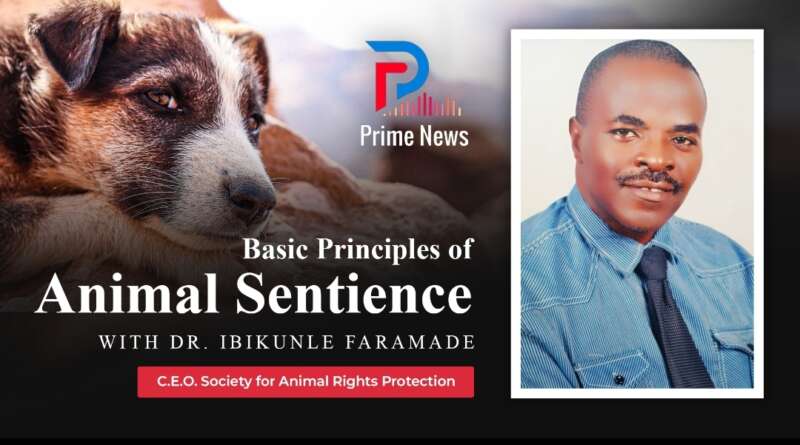Animal Welfare in The Context of Animal Attack: An Ethical Dilemma
By Dr. Ibikunle Faramade
The concept of animal welfare and animal rights have gained traction in most part of the world including both developed and developing countries. Although, it has gained tremendous ground in the western hemisphere ahead of the countries of the global south, including Africa and Asia.
It was Professor Roger Brambell, the Chair of the committee that examined the welfare of farm animals on the authority of the government of the United Kingdom in response to the outcry of the British public, that developed the concept of ‘ Five Freedoms’ that must be guaranteed in the spirit of animal welfare. This is contained in the 85-page ‘ Report of the Technical Committee to Inquire into the Welfare of Animals kept under Intensive Livestock Husbandry Systems’ which is popularly referred to as ‘ The Brambell Report’. The summary of the five freedoms are as follows:
- Freedom from hunger and thirst : by ready access to fresh water and suitable diet to maintain full health and vigor
- Freedom from discomfort: by providing an appropriate environment including shelter and a comfortable resting area.
- Freedom from pain, injury and diseases: by prevention or rapid diagnosis and treatment.
- Freedom to express normal behavior; by providing sufficient space, proper facilities and company of the animals own kind.
- Freedom from fear and distress: by ensuring conditions and treatment which avoid mental suffering.
These ‘five freedoms’ are used as the basis of writing animal care protocols and are set as minimum benchmark for assessment of compliance to animal welfare standards on the farm ( for farm animals) or for individual companion animals e.g. dogs, cats and horses. It is not correct, as it is speculated in some quarters, that the concept of animal welfare and its promotion, particularly in Africa, are not only alien but exotic.
In Nigeria, especially among the Yoruba people of the southwestern part, animal care and welfare were well entrenched in their culture. These could be seen in various proverbs in which the lessons were passed across. For example, a proverb says ‘ if you beat my dog, you have automatically beaten me’ rendered in Yoruba as ‘mo m’aja leyin, o jan ni’gi, emi naa lo jan ni’gi’ . Another one says ‘ eepa n pa ara re, ol’onpaja’ rendered literally as ‘ parasites are feasting on the dog to kill it , not knowing they are killing themselves’. This depicts their knowledge on why dogs should be free from parasites. They also have various taboos to restrict hunters from indiscriminate killing of animals. Such taboos include the ones that forbade hunters from killing animals that are seeing mating, breastfeeding or pregnant. These are evidences of good knowledge of animal welfare and sustainability of species. Just as children are given names with deep meanings, dogs are given names that show affection and closeness. These names include Eyinlaro (think of the consequences/ outcomes of actions), Tantolohun (no one is as big as God), Tanmeyinola (who knows the future). The Yoruba indeed, believe that animals and humans share certain similar qualities. These are few examples of the knowledge of animal welfare by our forebear. Animal welfare is not as foreign as we imagine after all!
Furthermore, the Abrahamic religions of Christianity, Judaism and Islam also have copious references to the principle of animal welfare (to be discussed later). In the civil law, animal welfare issues did not become a matter of legislation until the efforts of Richard Martins in the parliament of the United Kingdom in 1822. He was the first person who succeeded in achieving the passage of the bill entitled Ill Treatment of Cattle Bill into Law.
Now that we have established that the basic principles of animal welfare have been with us for ages, what should be our response to the issue of animal welfare in the face of animal attacks? In the context of both religious and secular provisions guaranteeing animal welfare, we should not forget that the laws have not transformed animals to humans. The laws have helped us to understand our obligations to animals in our care (domestic animals or wild animals). We should not underestimate the strength and aggressiveness of wild animals. We should not also take domestic animals for granted. Doing so may lead to unexpected fatalities. Animal and human boundaries (especially, wild animals) must be respected and enforced. Human welfare should not be compromised in the face of aggressive animals. For those animals in the zoological garden, safety of humans is paramount while providing sufficiently in compliance with the ‘Five Freedoms’ for wild animals in captivity.
There have been several records of fatalities across the world, where animal attacks (both domestic and wild) have led to human deaths. These include the attack of a zookeeper with 29 years of experience in Eastern Germany in 2017 by a Leopard, in 2023, a 72 years old crocodile farmer was killed in Cambodia by crocodiles. A Siberian Tiger killed a tourist in Eastern China in 2018. In addition, in February, 2018, a 22 year old woman was killed by a lion at a private game lodge close to Pretoria, South Africa. In August 2022, another South African conservationist was killed by lions he had hand reared. West Matthewson, who was walking two lioness was attacked and killed at the age of 69. These and many more are sad commentaries involving domestic animals, especially dogs globally. This was one of the reasons why Pit Bull breed of dog was outlawed in the United States of America some years back. Attack by Rotrweillers also abound with records of fatalities.
With these developments of loss of human lives due to animal attacks, should we then say that the concept of animal welfare should be disregarded? Not at all. This gives rise to the issue of ethical dilemma.
What is Ethical Dilemma?
Ethical dilemma is a situation in which a difficult choice has to be made between two courses of action, either of which entails transgressing a moral principle. It involves making a difficult decision on one thing at the expense of the other while considering the possible backlash after the decision.
Between human preservation and animal preservation (in view of conservation of biodiversity and sustainable development). Human welfare must come first. If an animal kills a human being, the animal cannot be spared in the name of welfare. This is because humans take fair precedence over animals. While animal welfare is a very good course, it has to be pursued with caution, not subordinating humans to animals.
Therefore, efforts should be geared towards making sure that necessary precautions are instituted to check the possibility of human attack by animals.
Wild animals held in captivity should be provided with comfortable habitat that mimics their natural environment. They should not be taken for granted and their threat to human lives should not be de-emphasized. Understanding the territorial instincts of animals coupled with the establishment of Standard Operating Procedures must be put in place. There must not be over familiarity tendencies when relating with them. In the spirit of animal welfare, the ‘Five Freedoms’ must be adequately ensured.
In conclusion, veterinarians and other categories of animal health workers must be adequately compensated for the enormous hazards to which they are exposed daily. Special life insurance policy could also be instituted for them so that, in case of any injury or (accidental) death, their families would not sink into penury, having served their country diligently. There should be training and retraining opportunities to improve their skills. They are also encouraged to embark on specialist trainings in order to be abreast with contemporary developments in their areas of specializations. Their safety should be paramount at all times.
We hereby dedicate this column to the memory of late Mr. Olabode Olawuyi, a proud product of the Federal College of Animal Health and Production Technology, Apata, Ibadan and a Senior Animal Health Superintendent at the Zoological Garden of the Obafemi Awolowo University, Ile- Ife, who lost his life in the line of duty recently.
May the Almighty God grant the family the fortitude to bear the irreparable loss. Amen.
Dr. Ibikunle Faramade is a veterinary pathologist and a lecturer at the Federal College of Animal Health & Production Technology, Apata. Ibadan. He’s the C.E.O of the Society for Animal Rights Protection, a non-profit and a non-governmental organization dedicated to the promotion of animal welfare, animal rights and prevention of cruelty to animals.
animalrightsprotection2020@gmail.com , +2348028305284




Amazing!
The thread is quite instructive, well done sir.
Educative, well done sir